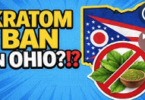
As of May 24, 199 people became ill with salmonella across 41 states. Fifty people were hospitalized, though not all reported that they took kratom. No deaths were reported.
Officials were never able to track down a single source of the infection, which causes a type of food poisoning, though half of the 66 kratom products they tested were infected with salmonella.
As a result, they believe that multiple retailers were selling kratom that was contaminated, and the investigation resulted in several recalls from distributors.
Kratom is an herbal supplement that can be smoked, sipped in tea, or taken as tablets. People who take it have said that it helps relieve chronic pain and depression, and can work as a replacement for opioids, which are highly addictive. Some people take it for its stimulating effects.
The Food and Drug Administration says it is still unsafe to take kratom, warning that people can still get salmonella if they take a batch that is contaminated.
As of April 5, 57 of 78 people who were asked about kratom reported taking it before getting sick.
Kratom is legal in the U.S. and has not been scheduled by the Drug Enforcement Administration, but the FDA has warned the public against taking it for reasons other than its suspected link to salmonella.
FDA has issued reports about deaths associated with kratom, though supporters of keeping the drug legal for research purposes note that the death certificates often mention the possible involvement other drugs.







